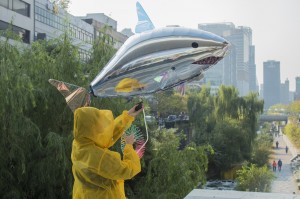Bristol media centre Watershed is financing six creative teams to build prototypes that connect people to their city in the latest version of its innovative Playable City scheme.
Watershed launched the Playable City Award 10 years ago, inviting artists from across the globe to create playful, creative technology installations that put people and play at the heart of the future city. 
Since then it has worked with around 75 partners and 50 creatives from Lagos to Recife, Tokyo to Melbourne and Singapore to Austin, reaching more than 1m people globally in the process.
The latest six new commissions have each been awarded £45,000 to build urban prototypes to be showcased in Bristol this July.
The projects place play at their heart, sparking imagination and conversation about inclusion, sustainability, surveillance and the future of cities.
The commissions will become part of the Playable City Sandbox, a shared development programme produced by Watershed as part of the University of Bristol’s MyWorld, which is funded by UK Research and Innovation’s Strength in Places Fund, to help support and grow the creative technology ecosystem of the West of England.
The six teams and prototypes are:
Squeeze Me, created by Emma Powell, Robert Nixdorf and Richard Sewell of Bristol creative robotics studio Air Giants, uses inflatable soft robotic technology to create a compelling and charming tactile and visual experience. Up to 10 huge, inflatable and illuminated creatures, wrapped around trees, lampposts or other street furniture, invite passers-by to hug, squeeze, lean on or poke them. Creatures will respond with shape-change, light and sound and will influence other creatures nearby.
Inspired by the Somali-style nomadic structure called the Aqal and created by Fozia Ismail and Ayan Cimli of Dhaqan Collective, The House of Weaving Songs is an interactive installation co-created with Somali communities in Bristol and beyond, integrating Somali weaving songs and woven tapestries in an experiment to connect the city to cultural practices that can inspire us in our fight to tackle climate change.
How (not) to be hit by a self-driving car, created by Tomo Kihara, Saki Coppen and Dan Coppen of Studio Playfool, is a game that challenges people to avoid being detected as human in the eye of an AI. With surveillance cameras becoming smarter and the cities we live in starting to see us back, it poses the question; how do they see us? Anyone can join the game, but can they get from start to finish without being detected?
Zoomscape Zoetropic is a light experience, designed by Jack Wates & Thomas Blackburn to be viewed from moving train windows arriving and departing from Bristol Temple Meads station. The content changes with each passing train, creating a new experience for passengers on daily commutes.
Created by Mike Salmon and Ossian Whiley of Glitch AR, Screaming Color & Arcane, Fireflies is a transformative immersive experience using virtual content to turn the streets and landmarks of Bristol into a colourful, sci-fi-infused digital jungle, awash with mesmerising visuals and local music.
Street Pixel is hardware graffiti; designed by Tom deMajo and Malath Abbas, Biome Collective & Sarah Selby to reinvigorate the relationship between people and their cities by transforming the street below into opportunities for connection and play using creative technology, game design and a sustainable approach to materials and electronic hardware.
Watershed research lead Furaha Asani said: “We are thrilled to announce six new Playable City prototypes, funded via MyWorld.
“After spending the last few years reflecting and gaining feedback on a number of themes including the democratisation of play, who has the right to play and feels safe playing in Bristol’s city spaces and what accessibility and inclusion in play mean, we’ve selected these six prototype teams who we believe fulfil the brief and will create free, fun, engaging experiences that we hope you all will enjoy this summer.”
MyWorld operations director Oscar De Mello added: “The Playable City Sandbox that Watershed has created is now a globally recognised format for supporting creative talent and enabling collaborative creative experimentation, and as a region we are so proud of what they have achieved.
“The selected projects showcase the diversity of thought and influences in our region and demonstrate perfectly how creative technology can be an enabler to connect communities and places in new ways.
“It’s so exciting to have this opportunity available for West of England businesses and researchers as part of MyWorld, and I can’t wait to try out the resulting prototypes.”
Over the past four years, the has provided an inclusive playground for many cities across the globe ranging from an interactive pack of origami-like light-projected
Following the last Playable City Awards in 2016, its model was adapted and developed to forge long term partnerships with like-minded producers from different cities around the world culminating in a creative producers international programme.
Playable City Sandbox will conclude with a public week-long showcase in Bristol this July.
To follow the prototypes’ progress and find out more, go to the Playable City website





























